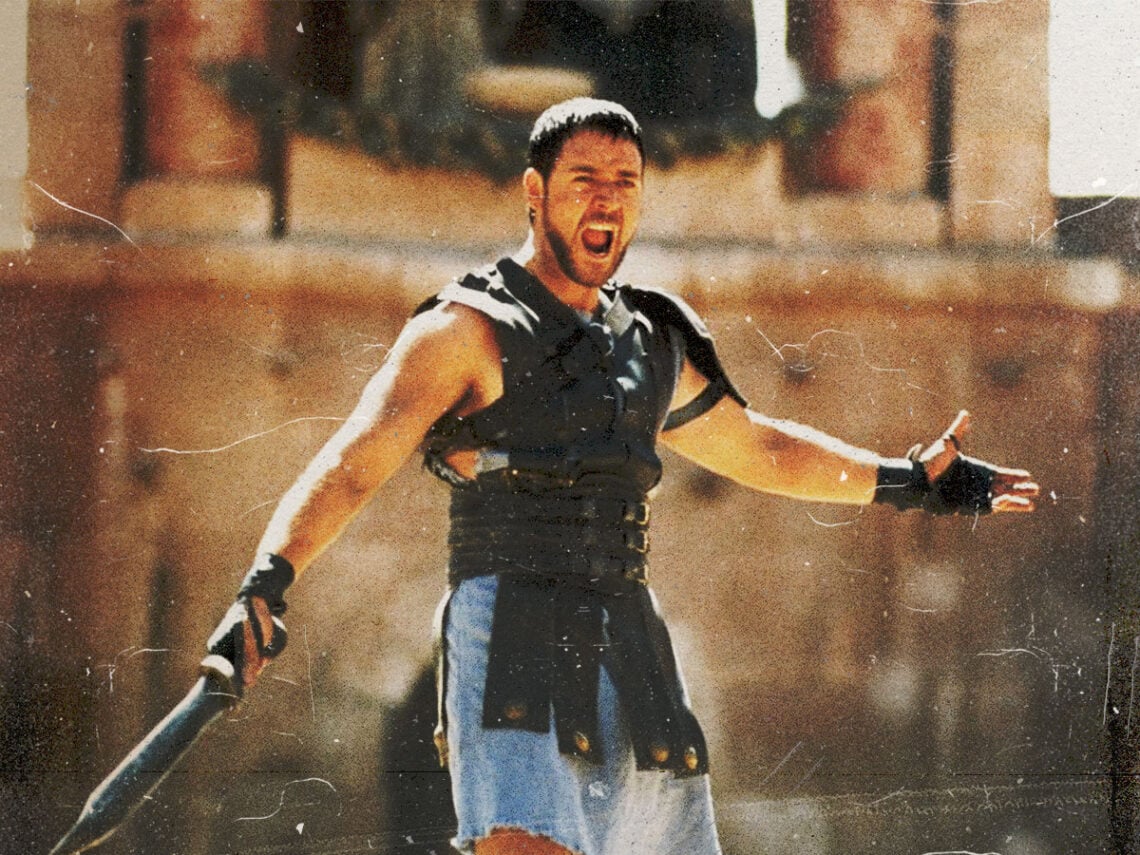🎬 Gladiator (2000)
- vansinh
- October 27, 2024

🎬 Gladiator (2000): A Tale of Honor and Revenge
Gladiator, directed by Ridley Scott, is an epic historical drama that transports viewers to the heart of ancient Rome, where loyalty, betrayal, and the quest for vengeance unfold in spectacular fashion. The film follows the journey of Maximus Decimus Meridius (Russell Crowe), a once-loyal general who finds himself betrayed by the corrupt emperor Commodus (Joaquin Phoenix) and thrust into the brutal world of gladiatorial combat. 🏛️⚔️
The story begins with Maximus leading his troops to victory in a fierce battle against Germanic tribes, earning the admiration of Emperor Marcus Aurelius (Richard Harris). The emperor wishes to name Maximus as his successor, believing he is the only man capable of restoring the Roman Empire to its former glory. However, Commodus, the emperor’s power-hungry son, is determined to seize control for himself and brutally murders his father, casting Maximus into slavery as a gladiator. This sets the stage for an intense tale of revenge and redemption as Maximus fights to reclaim his honor and avenge the wrongs done to him. 🛡️🔥
The film’s portrayal of the gladiatorial games is both visceral and exhilarating, showcasing the brutal realities of the arena where life and death hang in the balance. Maximus quickly rises through the ranks, becoming a celebrated champion known for his prowess and strategic skill in battle. His journey is marked by harrowing conflicts, not only with other gladiators but also with the Roman elite who manipulate the games for their own gain. The grand coliseum, filled with roaring crowds, becomes a battleground where Maximus must navigate treachery while keeping his ultimate goal in sight: to bring justice to Commodus. 🎭🏆
 Russell Crowe delivers a powerful performance as Maximus, embodying the character’s internal struggle and unwavering resolve. His portrayal captures the essence of a man torn between vengeance and the desire for peace, showcasing his transformation from a loyal general to a vengeful gladiator. Joaquin Phoenix’s portrayal of Commodus is equally compelling, depicting the emperor as a deeply flawed antagonist whose insecurities and ruthlessness drive the narrative forward. Their performances create a palpable tension, underscoring the themes of honor, betrayal, and the corrupting nature of power. 🎬👑
Russell Crowe delivers a powerful performance as Maximus, embodying the character’s internal struggle and unwavering resolve. His portrayal captures the essence of a man torn between vengeance and the desire for peace, showcasing his transformation from a loyal general to a vengeful gladiator. Joaquin Phoenix’s portrayal of Commodus is equally compelling, depicting the emperor as a deeply flawed antagonist whose insecurities and ruthlessness drive the narrative forward. Their performances create a palpable tension, underscoring the themes of honor, betrayal, and the corrupting nature of power. 🎬👑
As the story unfolds, Maximus forms alliances with fellow gladiators, including the fierce and loyal Hagen (Djimon Hounsou) and the clever Juba (Jamie Bell), who become his brothers-in-arms in the fight against oppression. Together, they navigate the treacherous political landscape of Rome, where loyalty is fleeting and betrayal lurks around every corner. The camaraderie among the gladiators adds depth to the film, highlighting the human connections that are forged in the most brutal of circumstances. 🤝⚔️
The film’s cinematography and score elevate the viewing experience, with Hans Zimmer’s iconic score enhancing the emotional weight of pivotal scenes. The grand visuals of ancient Rome, combined with the gritty realism of the gladiatorial battles, create a rich tapestry that immerses the audience in this epic tale. Scott’s direction ensures that every moment is packed with intensity and emotional resonance, making Gladiator a cinematic masterpiece. 🌅🎶
 Ultimately, Gladiator serves as a meditation on the nature of power, the fight for justice, and the enduring human spirit. Maximus’s quest for vengeance is not just a personal journey; it reflects a broader struggle against tyranny and the quest for freedom. The film culminates in a climactic showdown that not only resolves Maximus’s story but also echoes the larger themes of sacrifice and the search for honor in a world rife with corruption. ⚔️🌍
Ultimately, Gladiator serves as a meditation on the nature of power, the fight for justice, and the enduring human spirit. Maximus’s quest for vengeance is not just a personal journey; it reflects a broader struggle against tyranny and the quest for freedom. The film culminates in a climactic showdown that not only resolves Maximus’s story but also echoes the larger themes of sacrifice and the search for honor in a world rife with corruption. ⚔️🌍
Winning five Academy Awards, including Best Picture and Best Actor for Russell Crowe, Gladiator remains a landmark film that resonates with audiences for its powerful storytelling and profound themes. Its legacy continues to inspire discussions about heroism, honor, and the cost of revenge, solidifying its place in cinematic history. 🌟🏆












